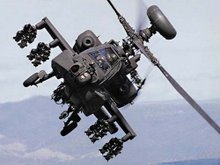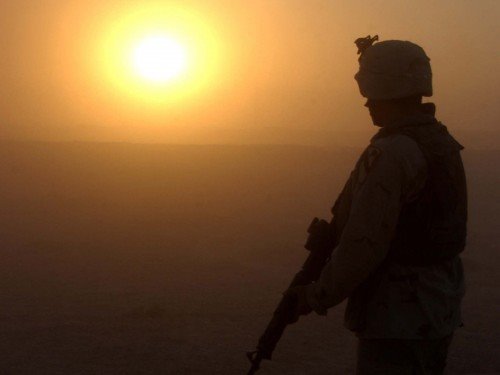The psychological toll on soldiers fighting insurgent wars are becoming increasingly obvious to anyone associated with the Global War on Terror (GWOT) - military family members, military command, the military mental health care system, the military justice system and military law practitioners such as myself.
I have represented and defended soldiers who have fought in Iraq and Afghanistan. I have defended cases out of both theaters. I have heard stories of fighting house-to-house, room-to-room. I have heard stories of taking almost daily fire in the mountains of Afghanistan, but not knowing where the fire was coming from due to the terrain. I have heard of the soldiers' realization that every time they traveled outside the wire they knew they could be a casualty of an IED - planted on the road, delivered via vehicle, secreted in the houses and buildings they enter or carried by the stream of "martyrs" lining up to kill the "infidels."
What does the enemy look like? The enemy often looks exactly like the innocent civilian shopping in the market. Everyone could be the enemy and could be that person willing to sacrifice him/herself to kill another American.
As a result, our soldiers are in a constant state of extreme stress and vigilance. They are surrounded by endless violence - directed at them and by them. It takes its toll. Then, the deployment ends and the soldiers come home...but what they saw and did and experienced comes home with them. I have seen once bright military careers quickly disintegrate as soldiers battle with their psychological wounds. I have seen these wounds result in substance abuse, allegations of domestic violence, allegations of extreme violence and murder. And, interestingly, I have defended courts-martial in which military prosecutors have asked judges and jurors to view the accused soldiers' descriptions of the psychological demons that haunt them as merely excuses to be discounted. I have seen commanders dismiss these issues as excuses. I have seen those in the military who won't accept the truth about these psychological traumas - perhaps because it isn't "manly" to do so, or because they deal with the dread that they too will experience these ghosts so they deny they exist...or because they are dealing with these wounds, but can't accept it.
The first step in helping these soldiers, and doing justice in cases involving these issues, is to recognize how significantly PTSD, TBI and combat related trauma impacts soldiers. These wounds are just as real as a lost limb or a bullet wound. And, their impact on soldiers' lives is just as real as well - and can be more long lasting.
Colorado Springs and Fort Carson have recently been receiving national interest due to allegations of violence and murder levied against FT Carson soldiers returning from the GWOT. These allegations have included many claims of murder. Below are just a few of the numerous articles addressing the psychological fallout and criminal allegations facing FT Carson soldiers:
http://news.yahoo.com/s/ap/20090726/ap_on_re_us/us_soldier_slayings
http://www.gazette.com/articles/iframe-59065-eastridge-audio.html
http://www.gazette.com/articles/html-59091-http-gazette.html
While FT Carson and Colorado Springs are receiving national focus, these psychological issues and criminal justice problems are occurring wherever soldiers are returning from the Middle East. In response to this widespread issue in Colorado Springs - that is affecting the military and civilian communities here - a Veterans' Court is being established. Below is a link to an article by Charles Corry, PhD from the Equal Justice Foundation (EJF) describing the Colorado Springs Veterans' Court, and the need for such a court:
http://www.ejfi.org/DV/dv-38.htm
This movement for a local court that recognizes the unique psychological issues suffered by soldiers returning from war is being spearheaded by concerned citizens such as Robert Alvarez, who works for the FT Carson Wounded Warrior Program (or Warrior Transition Unit). Here is a link describing Mr. Alvarez's work:
http://findarticles.com/p/articles/mi_qn4191/is_20090221/ai_n31491555/
The latest story on the Veterans' Court in Colorado Springs comes from CNN, describing the case of Army Specialist Thomas Delgado. SPC Delgado was a combat medic in Iraq who now faces accusations of domestic violence and attempted murder in what has been described by his wife as an incident born out of the desperation and hopelessness of a suicidal soldier. Here is the story:http://www.cnn.com/2009/CRIME/08/06/accused.soldier.ptsd/index.html
What is the reason for my post on this topic? I suppose there are several. First, for those in the civilian community to understand that these soldiers are not just "bad people" doing bad things. They have served in very difficult combat situations. They have sacrificed more for our country than most of us have. They have come home hurting - physically and psychologically. Second, for those in the military community (commanders and JAGs particularly) to recognize and take into consideration the impact these psychological wounds have on the soldiers' lives and actions. The wounds are real. They aren't just excuses. Third, that denying the existence of these psychological wounds and the impact they have, and denying how widespread the problem is, can have devestating consequences and perpetuate the problem. And, finally, that the court systems dealing with these soldiers, whether in a civilian Veterans' Court or in military courts-martial, need to recognize and account for how the trauma suffered by these soldiers has altered how they think, how they act, and who they are.
Are Veterans' Courts needed? Absolutely. Do military commanders, prosecutors and court members need to stop denying the psychological impact of trauma and treating the issue as an excuse? No doubt. Do soldiers themselves need to recognize and seek help for the psychological impacts they have suffered, instead of believing it is a sign of weakness and they can "tough it out?" That is key.
Dealing fairly and effectively with these soldiers is an effort requiring the involvement of many - command, mental health, legal (JAG and civilian), the courts (courts-martial and civilian) and the individual soldiers themselves. If these soldiers are going to kill the enemy and risk dying overseas for our country, don't we owe them more when they come back home suffering the effects of their sacrifices?
By: Attorney Richard V. Stevens
Civilian criminal defense lawyer and military defense lawyer
Military Defense Law Offices of Richard V. Stevens, PC
www.militaryadvocate.com
Blog postscript: Attorney Frank Spinner and I (attorney Richard Stevens) are former active duty military lawyers (JAG). Our perspectives and advice, therefore, are based upon our experience as military defense lawyers and as civilian criminal defense lawyers practicing exclusively in the area of military law. This blog addresses issues in military law, military justice, military discipline, military defense, court-martial practice, the Uniform Code of Military Justice (UCMJ) and other military and/or legal topics. Nothing posted in this blog should be substituted for legal advice in any particular case. If you seek legal advice for a particular case, please contact The Law Offices of Richard V. Stevens & The Law Office of Frank J. Spinner for a free consultation. Military defense law offices are located in Colorado Springs, Colorado. Military defense law practices are worldwide.
























No comments:
Post a Comment